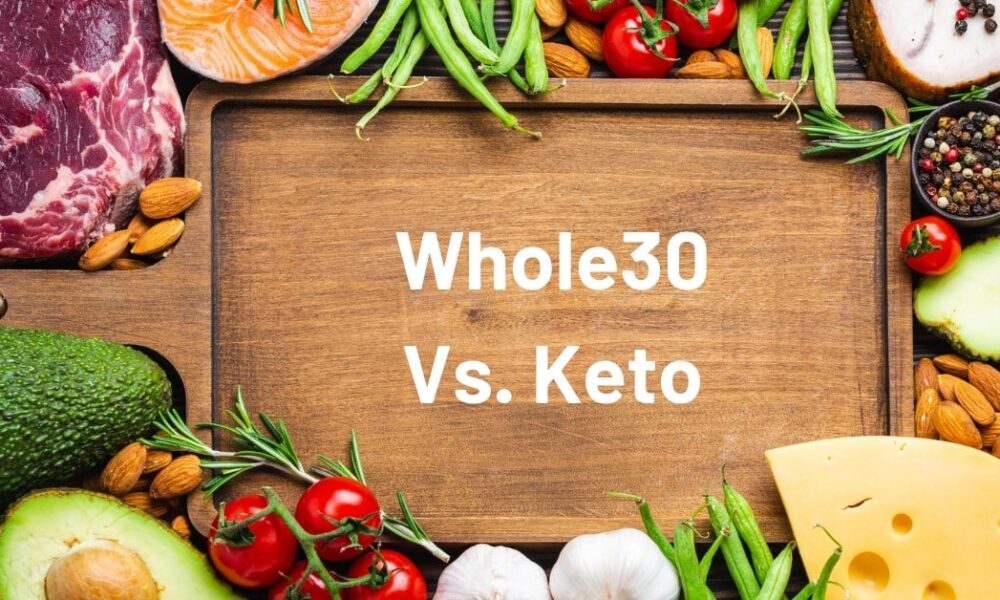As people become more conscious of their health and wellness, they are exploring different diets and lifestyles to achieve their goals. Two popular diets that have gained attention in recent years are the ketogenic (keto) diet and the Whole30 diet. Both diets are known to promote weight loss, improve overall health, and boost energy levels. However, they differ in their approach, restrictions, and outcomes. In this article, we will delve into the differences between the keto and Whole30 diets, their pros and cons, and help you decide which diet might be best for you.

Important Points to remember:
Before we dive into the pros and cons of both diets, it’s essential to understand their basics.
The Keto Diet
The ketogenic diet is a low-carb, high-fat diet that involves drastically reducing your carbohydrate intake and replacing it with healthy fats. By doing so, your body enters a metabolic state called ketosis, where it burns fat for energy instead of glucose.
To follow the keto diet, you need to consume about 70-80% of your daily calories from fats, 20-25% from protein, and only 5-10% from carbohydrates. This means that you need to limit your intake of grains, legumes, fruits, and starchy vegetables while eating plenty of healthy fats such as avocado, nuts, seeds, coconut oil, and olive oil.

The Whole30 Diet:
The Whole30 diet is a 30-day clean eating program that eliminates certain food groups that can cause inflammation, gut issues, and other health problems. These foods include grains, legumes, dairy, sugar, and processed foods. The idea behind the Whole30 is to reset your body and improve your gut health by eating whole, unprocessed foods.
During the 30-day program, you’re allowed to eat meat, seafood, eggs, vegetables, fruits, and healthy fats such as olive oil, coconut oil, and avocado oil. However, you need to avoid all forms of added sugar, alcohol, grains, legumes, dairy, and processed foods.

FAQ’s:
Which diet is more effective for weight loss?
Both diets have been shown to promote weight loss, but the keto diet may be more effective in the short term. Studies have found that people who follow the keto diet lose more weight initially than those who follow the Whole30. However, the Whole30 is designed as a 30-day program to reset your body and improve gut health, while the keto diet is a long-term lifestyle change. So, it’s important to consider your goals when deciding which diet is right for you.
Can you exercise while following these diets?
Yes, you can exercise while following both diets. However, the keto diet may require some adjustments to your exercise routine since your body is using fat for energy instead of glucose. You may experience a decrease in energy levels during the initial phase of the diet, but your energy should stabilize once your body adapts to ketosis. On the other hand, the Whole30 diet emphasizes whole, nutrient-dense foods, which can help improve your energy levels and athletic performance.
Are these diets safe?
Both diets are generally considered safe for healthy individuals. However, the keto diet may not be suitable for people with certain medical conditions such as diabetes, liver disease, or pancreatic conditions. It’s important to consult with your doctor before starting any new diet.
Can you eat out while following these diets?
Yes, you can eat out while following both diets, but you may need to make some adjustments to your order. For the keto diet, you need to avoid high-carb foods such as bread, pasta, and rice, and opt for protein and healthy fat options. For the Whole30, you need to avoid all forms of added sugar, grains, legumes, dairy, and processed foods, and stick to whole, unprocessed options such as grilled meat or seafood, salads, and vegetables.
Can you maintain these diets long term?
The keto diet is designed to be a long-term lifestyle change, while the Whole30 is a 30-day program designed to reset your body and improve gut health. However, both diets can be maintained long term if they are modified to meet your individual needs and preferences. It’s important to consult with a registered dietitian to ensure you are getting all the nutrients you need and to make adjustments as necessary.

Pro’s:
Weight loss: Both diets have been shown to promote weight loss, which can help improve overall health and reduce the risk of chronic diseases such as type 2 diabetes, heart disease, and certain cancers.
Improved energy levels: Both diets emphasize whole, nutrient-dense foods, which can help improve energy levels and reduce fatigue.
Improved gut health: The Whole30 diet is designed to improve gut health by eliminating foods that can cause inflammation and gut issues, while the keto diet can also help improve gut health by promoting the growth of healthy gut bacteria.
Reduced inflammation: Both diets have been shown to reduce inflammation in the body, which can help reduce the risk of chronic diseases.
Flexibility: Both diets can be modified to meet individual needs and preferences, making them flexible and sustainable long term.

Con’s:
Restrictive: Both diets are restrictive and can be challenging to follow, especially for those who are used to eating a wide variety of foods.
Nutrient deficiencies: If not followed properly, both diets can lead to nutrient deficiencies, especially in essential vitamins and minerals.
Social limitations: Both diets can be challenging to follow in social situations, such as dining out or attending events.
Initial side effects: The keto diet can cause initial side effects such as fatigue, headaches, and constipation, while the Whole30 can cause initial cravings and withdrawals from eliminated foods. Long-term sustainability: Both diets can be challenging to maintain long term, and it’s important to modify them to meet individual needs and preferences to ensure sustainability.

Final Verdict:
Both the keto and Whole30 diets have their benefits and drawbacks. Ultimately, the diet that is right for you depends on your individual needs, preferences, and goals. If you’re looking for a short-term reset to improve gut health, the Whole30 may be a good option. If you’re looking for a long-term lifestyle change to promote weight loss and improve overall health, the keto diet may be a better fit. However, it’s important to consult with a registered dietitian before starting any new diet to ensure you’re getting all the nutrients you need and to make adjustments as necessary. Additionally, it’s important to remember that no one diet is a one-size-fits-all solution, and it’s essential to find a healthy and sustainable eating pattern that works for you.












No Comment! Be the first one.